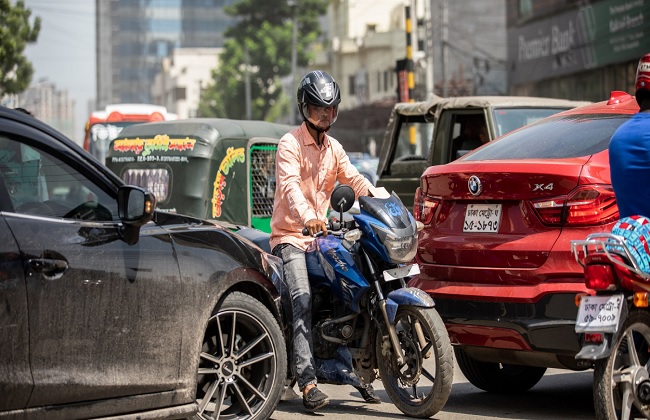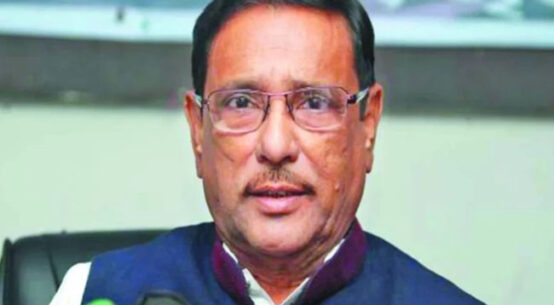
In Bangladesh, motorcycles, with their ease of navigation and cost-effectiveness, have become a popular mode of transport. However, this preference comes with a significant drawback: motorcycles are at the epicenter of the nation’s road safety crisis. While there was a hopeful decrease in motorcycle-related accidents in the past year compared to 2022, these two-wheelers remain the most common protagonist in the tragic tales of road accidents across the country. The situation is dire, with not only deaths being a common outcome but an increasing number of individuals suffering life-altering injuries, including the loss of limbs.
The National Committee to Protect Shipping, Roads and Railways (NCPSRR), a vigilant civic organization, illuminates this pressing issue with alarming statistics: from 2020 to 2023, 33-40% of all annual road accidents involved motorcycles. This figure has been on a distressing upward trajectory since the start of this year. According to the NCPSRR, the daily average ranges from 8 to 10 fatalities in 10 to 12 motorcycle accidents-a grim statistic that often escapes the attention of the national media spotlight.
The heart of this crisis is attributed to the presence of underage, unskilled, and unlicensed drivers on the roads. The lack of stringent enforcement by the Bangladesh Road Transport Authority (BRTA) and the police has been pinpointed as a contributing factor. Ashis Kumar Dey, the general secretary of NCPSRR, doesn’t mince words when he lists the reasons behind the spike in motorcycle accidents: the proliferation of motorcycles, including many that are unlicensed, and reckless driving habits are significant contributors. Dey strongly believes that both law enforcement and the regulatory body, BRTA, need to intensify their efforts.
To combat this escalating problem, Dey proposes a comprehensive crackdown on underage and unlicensed riders and unregistered motorcycles. He advocates for the implementation of mobile courts across all districts for three consecutive months, a bold strategy aimed at curtailing the rampant violations contributing to road safety hazards.
The Road Safety Foundation (RSF) adds a quantitative dimension to the discourse with its annual report, revealing that in 2023, 6,524 individuals, including 974 women and 1,128 children, lost their lives in 6,911 road accidents across the country. Motorbike riders and pillion passengers comprised a staggering 38.12% of these fatalities.
Delving deeper into the data, RSF provides a comparative analysis of motorcycle accidents and fatalities over recent years, presenting a grim narrative of increasing incidents and loss of lives, peaking in 2022. However, a glimmer of hope emerges from the 2023 statistics, showing a 14.83% decrease in accidents and a 19.54% drop in fatalities compared to the previous year. Despite this positive trend, Saidur Rahman, executive director of RSF, remains cautious, warning that this decrease should not be prematurely celebrated as a sign of sustained improvement in road safety.
Rahman further elaborates on the challenges at hand, pointing out that motorcycles constitute 71% of all motor vehicles in the country, with a significant portion of these riders being teenagers and young adults. This demographic exhibits a pronounced disregard for traffic laws, exacerbated by a lack of stringent monitoring and enforcement, leading to reckless behavior and tragic outcomes.
The discourse takes a critical turn as Rahman highlights the frequent clashes between motorcycles and larger vehicles such as trucks, covered vans, and buses. The drivers of these larger vehicles often lack the necessary skill or are overworked, contributing to their involvement in accidents with motorcycles. The inadequacy of the public transport system and the chronic issue of traffic congestion have further popularized motorcycles as a preferred mode of transport, despite the associated risks.
In a noteworthy development, Rahman acknowledges the role of increased awareness and the efforts of highway police in the recent decline in motorcycle accidents. Abu Raihan Md Saleh, Joint Commissioner (Traffic-North) of Dhaka Metropolitan Police, supports this view, attributing the reduction in accidents to the rigorous enforcement of traffic laws. Saleh’s remarks underline the police’s commitment to curbing reckless riding, unregistered bikes, and license violations, although this has led to complaints from bikers about perceived overzealous policing.
Saleh also emphasizes the crucial role of parental responsibility in preventing underage and inexperienced individuals from taking to the roads on motorcycles. He expresses optimism that with heightened vigilance from parents and guardians, the trend of motorcycle accidents can be further curbed.
This multifaceted crisis of motorcycle safety in Bangladesh calls for a concerted effort from all stakeholders: law enforcement, regulatory bodies, civic organizations, and the community at large. The statistics and stories paint a clear picture of the challenge ahead, yet they also offer a blueprint for action. By addressing the root causes of motorcycle accidents and implementing targeted safety measures, Bangladesh can hope to navigate its way out of this perilous situation, making its roads safer for everyone.


